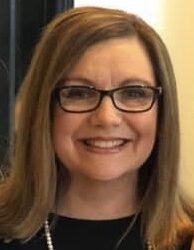 Jeannine Millner is a non-traditional, first-generation student (age 61) who previously didn’t have the opportunity to attend college. She is from St. Louis and is studying in the humanities department here at Fontbonne. She is also dually enrolled at Yale. We talked to Jeannine to learn a little more about her, check out our Q&A!
Jeannine Millner is a non-traditional, first-generation student (age 61) who previously didn’t have the opportunity to attend college. She is from St. Louis and is studying in the humanities department here at Fontbonne. She is also dually enrolled at Yale. We talked to Jeannine to learn a little more about her, check out our Q&A!
Why did you choose Fontbonne?
After applying and interviewing at three other local universities, it was immediately clear that I “fit in” at FBU. I was welcomed with open arms. I’ve never looked back.
Why did you choose humanities?
Not knowing exactly what undergraduate degree I would need for the work I would do in the next chapter of my life, I “googled” until I found something that made sense to me. This particular definition of the humanities tied everything together for me. I wrote it on an index card and have kept it in my desk drawer as a reminder of my goals and as a source of inspiration when needed:
“The humanities – including the study of languages, literature, history, jurisprudence, philosophy, comparative religion, ethics, and the arts – are disciplines of memory and imagination, telling us where we have been and helping us envision where we are going.”
– The Heart of the Matter(Report of the American Academy of Arts & Science’s Commission on the Humanities and Social Sciences to the U. S. Congress in June 2013)
How would you explain humanities to someone that doesn’t know what you do?
I would tell them that the courses within humanistic studies make us more complete individuals, capable of appreciating all the beauty in the world around us and, more importantly, within us. Humanities enhance our lives and enrich our souls, making us better humans.
What are the best parts of this department?
Three things come to mind. First, the faculty’s commitment to higher education and their ability to impart knowledge to us that we will need if we are to be successful, contributing members of society. Second, their unwavering support of our students, especially during the unprecedented time of Covid-19 when all of us (faculty, students, and staff) had to shift to online learning …something that most of us had not anticipated doing. Ever. And, finally, the cohesiveness within the department. The faculty not only respect each other but they really like each other and enjoy working together.
What would you tell prospective students looking to pursue the same course?
I would tell them that, if they are planning to major in Religious Studies, there may be no better university than Fontbonne. While here, I have learned global theology and the skills needed to fully understand and respect those whose religious beliefs are different than mine. Although Fontbonne is a Catholic university, the institution holds the tenets of all living religions in the highest regard. As a non-Catholic, my beliefs and values are not merely respected, they are valued at Fontbonne.
In what ways are you involved in the community on and off-campus?
I participated in the TELOS Honors Program my first two years and I am a member of the Fontbonne chapter of Omicron Delta Kappa, a national leadership honor society. Through my participation in TELOS, I became involved with Annie’s Hope, the center for grieving children, where I volunteer facilitating family grief counseling. I am also a member of the board of directors for a local fire district. I find both roles very rewarding.
Things you have accomplished while at Fontbonne?
This may sound trivial but, after being out of school for 40 years, I had to learn how to study again. And I had to hit the proverbial deck running when it came to our web-based learning management system. I had just mastered Schoology when Fontbonne switched to Canvas. Fortunately, for me, Canvas was the LMS used at another university I attended during the pandemic when most of us were learning from home – which is another accomplishment of which I am most proud and by which I am most humbled. Some of the classes I needed (if I was to graduate on time) were only offered “in-person” at a time when I was more comfortable staying home because my husband is a physician on the front lines of Covid. At his suggestion, and with Fontbonne’s approval, I applied to Yale University for my philosophy and English classes and was quite surprised to find myself dually enrolled for my Junior year!
How do you feel this department has prepared you for post-graduation?
Fontbonne University, through my affiliation with its Department of Humanities, has taught me to think critically, act ethically, and serve responsibly …with an acuity that I had not previously realized.
Your overall Fontbonne experience and would you recommend attending here to incoming students?
Honestly, I was terrified to be in college at age 58. I was afraid traditional students would ignore me or resent me. At the very least, they would have no appreciation for my life experience. There was always the chance that faculty might view me as a bored housewife who didn’t need to worry about a GPA or who didn’t take the assignments seriously. I couldn’t have been more wrong! Students and professors alike, treated me no differently than any other Fontbonne student. It has been a very fulfilling and gratifying experience. I would wholeheartedly recommend Fontbonne University to all prospective students.
What are your career goals and how has your chosen major helped you prepare for those?
During my time at Fontbonne, I became aware of a vocation to serve those who are entering the final journey of life. My degree in Religious Studies has helped me form the basis of understanding the varying viewpoints of death as well as different cultural perspectives as I continue my studies. I plan to pursue a Master of Science in Thanatology to prepare me for a career as an end-of-life doula, helping those who are facing death address its many perspectives including physical, ethical, spiritual, sociological, and psychological.

